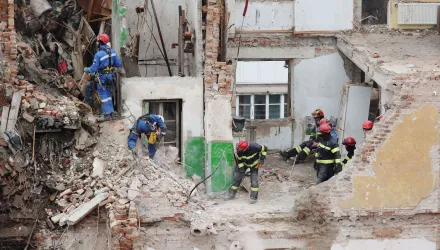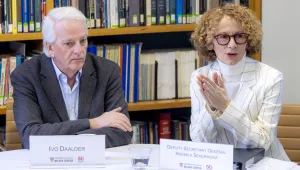
The following is an event write-up about the recent Project on Europe and the Transatlantic Relationship (PETR) seminar on “France’s Global Role in a Changing World Order” co-moderated by Natalie Colbert, Executive Director of the Belfer Center, and Svenja Kirsch, Fellow with PETR, on April 19, 2023.
The following is an event write-up about the recent Project on Europe and the Transatlantic Relationship (PETR) seminar on “France’s Global Role in a Changing World Order” co-moderated by Natalie Colbert, Executive Director of the Belfer Center, and Svenja Kirsch, Fellow with PETR, on April 19, 2023.
In his opening remarks, former French Prime Minister Édouard Philippe re-affirmed France’s commitment to NATO and the transatlantic alliance. He emphasized that France is “serious” about the transatlantic alliance: “When allies are at risk, we are there. We were there in Afghanistan. We were there in Kosovo. And before the Russian war in Ukraine started, we sent troops in order to reassure Romania and the Baltic States.” He regards the focus of the past three American administrations on the Indio-Pacific and related assertions “that Europe should handle its problems by itself [as consistent] with the French vision of [European] strategic autonomy.”
Philippe continued by emphasizing that “to make the transatlantic alliance stronger, there has to be a stronger European pillar to it. Differences trigger divergencies, which trigger distrust, and the geo-strategic context isn’t the most appropriate to accept a lack of trust inside NATO.” While the allies should be proud of their unity in supporting Ukraine, Philippe pointed to the need to speed up weapons deliveries, and to close loopholes of sanctions against Russia. Philippe also highlighted the importance of convincing the Global South of the importance of the Ukraine war: “We don’t need a Russian negotiation which would only suspend military action in Ukraine and embolden military adventures elsewhere: We need Ukraine to win.”
Philippe concluded his opening remarks by emphasizing that NATO and the EU make France stronger as it “aims to recover its grandeur.” Relatedly, he stressed that “the U.S. […] needs a stronger EU which can withstand the turmoil over time.” In his opinion, a stronger EU is of vital importance to the U.S. “because multilateral organizations have been systematically weakened [by] the rise of China.”
In conversation with the moderators, Philippe addressed the domestic protests against President Macron’s pension reforms, EU defense policy amid the war in Ukraine, France’s engagement with China, and the state of French-African relations. In his view “the biggest challenge France is facing is not doing reforms.” But according to Philippe, reforming the pension system is a uniquely hard issue to solve in the French context and there is an “inherent irrationality of the public debate on pension reforms.” In his view, it is the impoverishment of the lower middle class, cultural anxiety, reduced intergenerational mobility, and the perceived distance from political decision makers that is causing societal tensions around the pension system.
Emphasizing that the war in Ukraine had the positive effect of strengthening European unity and scaled-up investment in security, Philippe stressed that the Russian invasion represents a “wake up call.” According to Philippe, European investment in security must happen in collaboration with NATO. However, not all European countries are on the same page as France is when it comes to establishing Europe as a military power in addition to a soft power. Philippe stressed that much more needs to be done to build the European defense sector, including convincing the U.S. that a stronger European defense industry does not represent a threat.
When asked about Macron’s recent visit to China, after which American and European policymakers criticized the French President, Philippe made clear that “the French position on China did not change.” One should not “read too much into Macron’s declaration and China remains [both] a partner in global matters [..] and a competitor on other issues.” In his opinion, it is a false approach to make countries choose sides between the U.S. and China. Engaging in diplomacy with China and even with Russia is not a mistake. He noted, “France is not at war with Russia, neither is the U.S.,” and thus policymakers on both sides of the Atlantic should continue engaging diplomatically.
On the topic of French Africa policy and recent troop withdrawals from the continent, Philippe stressed the importance of his country’s ties to African nations. According to Philippe, France's “links with and presence in Africa will evolve.” Acknowledging the fragility of France’s relationship with Africa given the complexity of France’s colonial past, Philippe emphasized his hope for it not just being “a symbolic and sentimental relationship.” While “France has to be modest when it speaks about Africa,” he projected that deeper relations could be fostered across economic and academic spaces.
Watch the full event here.
Kirsch, Svenja. “EVENT DEBRIEF: France’s Global Role in a Changing World Order.” Belfer Center for Science and International Affairs, May 9, 2023





